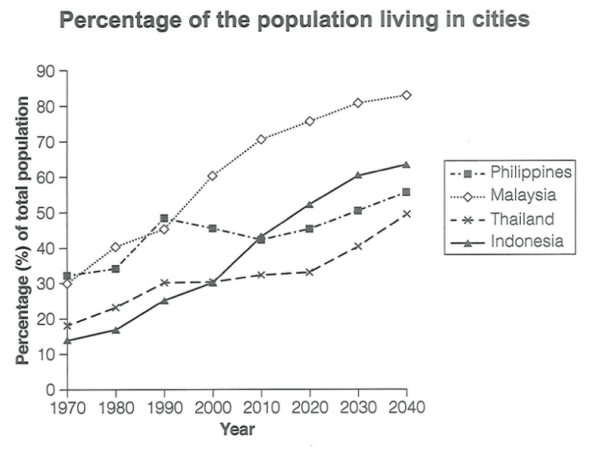Question: The graph below gives information about the percentage of the population in four Asian countries living in cities from 1970 to 2020, with predictions for 2030 and 2040. Summarise the information by selecting and reporting the main features, and make comparisons where relevant.
Please tell me if I have any mistakes with this writing and what band I will get? Thank you.
"The line graph compares four Asian countries in terms of the proportion of population living in cities between 1970 and 2020, along with projections for 2030 and 2040.
Overall, it is apparent that the percentage of population living in cities in all of these countries will likely increase, with Malaysia representing the greatest growth. These patterns will continue into the future.
In 1970, roughly 32% of the population of the Philippines lived in cities, while the figure for Malaysia was 30%. Malaysia then witnessed a substantial increase, at 75% by 2020. Meanwhile, the Philippines experienced a fluctuation between around 32% and 45%. The proportion of city dwellers in Thailand and Indonesia were considerably lower, accounting for nearly 20% and approximately 13% respectively in 1970. There was a dramatic increase in the population living in cities in Indonesia, reaching 50% by 2020. Thailand followed the same pattern, but at a slower rate, reaching 30%.
The projections indicate that the percentage of city dwellers in all four Asian countries will keep rising. By 2040, Malaysia is expected to represent the highest proportion of population living in cities, surpassing 80%, followed by Indonesia with 60%. Both the Philippines and Thailand are also projected to see a considerable growth, with cities holding about 55% and 45% of the population respectively."
Please tell me if I have any mistakes with this writing and what band I will get? Thank you.
"The line graph compares four Asian countries in terms of the proportion of population living in cities between 1970 and 2020, along with projections for 2030 and 2040.
Overall, it is apparent that the percentage of population living in cities in all of these countries will likely increase, with Malaysia representing the greatest growth. These patterns will continue into the future.
In 1970, roughly 32% of the population of the Philippines lived in cities, while the figure for Malaysia was 30%. Malaysia then witnessed a substantial increase, at 75% by 2020. Meanwhile, the Philippines experienced a fluctuation between around 32% and 45%. The proportion of city dwellers in Thailand and Indonesia were considerably lower, accounting for nearly 20% and approximately 13% respectively in 1970. There was a dramatic increase in the population living in cities in Indonesia, reaching 50% by 2020. Thailand followed the same pattern, but at a slower rate, reaching 30%.
The projections indicate that the percentage of city dwellers in all four Asian countries will keep rising. By 2040, Malaysia is expected to represent the highest proportion of population living in cities, surpassing 80%, followed by Indonesia with 60%. Both the Philippines and Thailand are also projected to see a considerable growth, with cities holding about 55% and 45% of the population respectively."

Untitled.png
